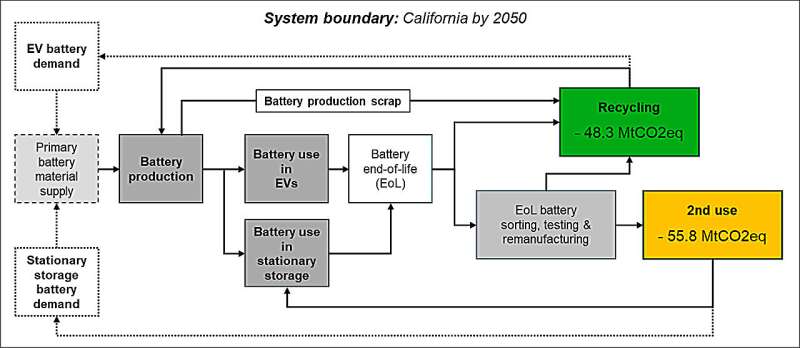Reusing EV batteries for energy storage can offer greater carbon savings than direct recycling
When electric vehicle (EV) batteries reach the end of their service life, they can be recycled to recover valuable raw materials for the production of new batteries. Alternatively, retired EV batteries can be repurposed for use as stationary energy storage systems, helping to integrate renewable energy into the power grid, manage peak loads, and enhance energy security.
Both recycling and second-life use are based on principles of circular economy. But which option is preferable—immediate recycling or second-life use? To answer this question, researchers from the University of Münster (Germany), the Fraunhofer Research Institution for Battery Cell Production FFB (Germany), and the Lawrence Berkeley National Laboratory (U.S.) conducted a study using California as a case study.
The researchers found that deploying end-of-life EV batteries as stationary energy storage devices is more effective in reducing greenhouse gas emissions than immediate recycling. They therefore recommend that countries with a high percentage of renewable energies should prioritize the reuse of retired EV batteries as stationary energy storage devices before recycling. The work is published in Environmental Science & Technology.
The calculations indicate that approximately 61% of the demand for EV batteries in California could be met by 2050 if all end-of-life EV batteries are recycled, with no second-life use. This approach would also save about 48 million tons of carbon dioxide. In contrast, prioritizing the reuse of EV batteries would save 56 million tons of carbon dioxide emissions.
The findings further reveal that by 2050 the volume of end-of-life EV batteries will significantly exceed the demand for stationary energy storage systems in California. Utilizing only lithium iron phosphate batteries—which are particularly well-suited for stationary storage—would be sufficient to meet this demand by 2050. Therefore, the authors recommend the state start developing a recycling infrastructure early, even if second-life use is initially prioritized.
The results highlight the importance of holistic, systemic planning for battery supply chains, encompassing production, recycling, and second-life applications. Countries that proactively start building these entire systems at a regional level and align their infrastructure with future demand for battery materials will be better positioned to reap the benefits of the circular economy for EV batteries.
Previous research has shown that producing EV batteries with recycled materials generates fewer greenhouse gas emissions than using primary (mined) raw materials. It is also well established that reusing end-of-life EV batteries in stationary energy storage systems results in significantly lower emissions compared to manufacturing new batteries from primary materials. However, until now, no study had systematically compared these two approaches.
Methodology
Using available data on various factors, e.g., emissions, recycling process efficiency, sales figures, and battery lifespan, the researchers modeled and compared three different scenarios. In the “baseline scenario,” they assumed that 2.5% of end-of-life EV batteries are first repurposed as stationary energy storage devices, while the remainder are immediately recycled.
In the “recycling scenario,” all end-of-life EV batteries are recycled with no reuse. In the “second use scenario,” end-of-life batteries are prioritized for reuse as stationary energy storage devices until demand is fully met; any remaining batteries are then recycled.
More information:
Jannis Wesselkämper et al, Recycling or Second Use? Supply Potentials and Climate Effects of End-of-Life Electric Vehicle Batteries, Environmental Science & Technology (2025). DOI: 10.1021/acs.est.5c01823
University of Münster
Citation:
Reusing EV batteries for energy storage can offer greater carbon savings than direct recycling (2025, July 29)
retrieved 30 July 2025
from https://techxplore.com/news/2025-07-reusing-ev-batteries-energy-storage.html
This document is subject to copyright. Apart from any fair dealing for the purpose of private study or research, no
part may be reproduced without the written permission. The content is provided for information purposes only.

Comments are closed